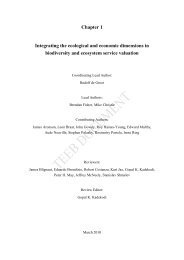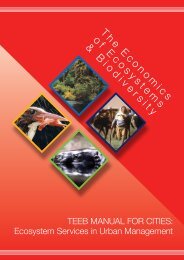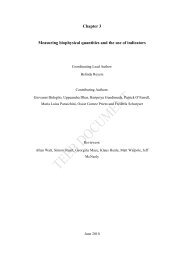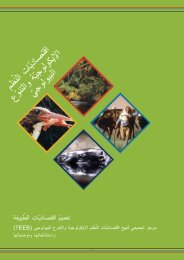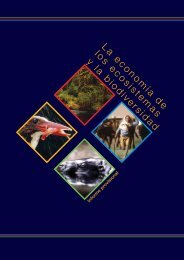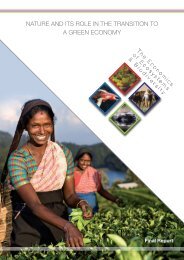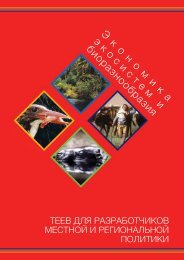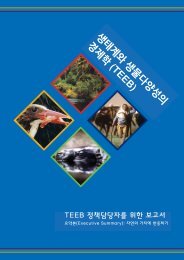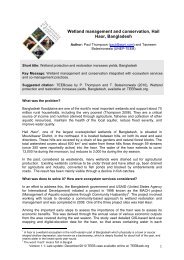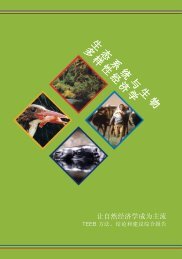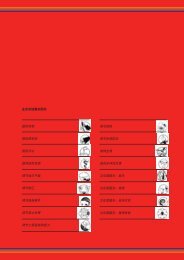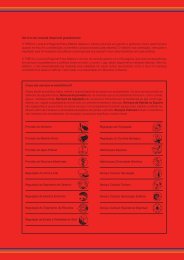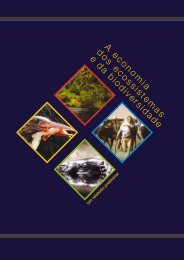Download (PDF, 6.71MB) - TEEB
Download (PDF, 6.71MB) - TEEB
Download (PDF, 6.71MB) - TEEB
You also want an ePaper? Increase the reach of your titles
YUMPU automatically turns print PDFs into web optimized ePapers that Google loves.
10.5<br />
Biodiversity and ecosystem services are natural<br />
assets with a key role to play in future economic<br />
strategies seeking to promote growth and prosperity.<br />
Developing and further strengthening policy<br />
frameworks to manage the transition to a resource<br />
efficient economy is the way forward.<br />
The <strong>TEEB</strong> studies build on and take forward the groundbreaking<br />
work already carried out by other international<br />
efforts. The Millennium Ecosystem Assessment showed<br />
how natural capital is critical to human survival and wellbeing.<br />
A series of subsequent assessments – like<br />
UNEP’s Global Environment Outlook (UNEP GEO-4<br />
2007), the IPCC’s 4th Climate Change Report (IPCC<br />
2007), the OECD’s Environment Outlook 2030 (OECD<br />
2008), the International Assessment of Agricultural<br />
Knowledge Science and Technology for Development<br />
(IAASTD 2009), the FAO/World Bank’s Sunken Billions<br />
report (World Bank and FAO 2008) and the 3rd UN<br />
World Water Development Report (UN WWAP 2009) –<br />
have all highlighted the rapidly evolving crisis threatening<br />
our natural assets. When we examine all of this evidence<br />
together, we are faced with significant economic costs<br />
that should be reflected in our policy choices.<br />
10.5.1 POLICIES MAKE A DIFFERENCE<br />
Natural capital is the web that provides services to<br />
humanity and supports our economies. It can make a<br />
significant contribution to resolving current crises related<br />
to climate change, food security and water scarcity<br />
while simultaneously addressing development options<br />
for overcoming poverty (see section 10.4). <strong>TEEB</strong> builds<br />
on best practice and lessons learnt so far in order to<br />
provide inspiration on how this can be achieved.<br />
There is no single 'solution' as each country is different,<br />
each economy relies on nature in a different way and each<br />
country starts with a different set of policies already in place.<br />
RESPONDING TO THE VALUE OF NATURE<br />
NATURAL CAPITAL THAT<br />
DELIVERS PROSPERITY<br />
However, the following two recommendations may apply in<br />
almost all cases, irrespective of the specific setting:<br />
• The policy response should not be limited to<br />
‘environmental’ policy-making processes, but also<br />
needs to come from other sectoral policies like<br />
fisheries, agriculture, forestry, energy, food and<br />
beverages, extractive industries, transport, tourism<br />
and health – to name but a few.<br />
• The value of our natural capital can be much better<br />
reflected in decision-making if broadly considered<br />
– from national accounting, regulation and fiscal<br />
policy, to public and private procurement and<br />
government spending. The application of single<br />
policy instruments may sometimes work, but more<br />
often the appropriate policy response will involve a<br />
flexible and ‘smart’ policy mix. Such a mix can be<br />
delivered through a step-wise approach that starts<br />
with the most easily available opportunities, i.e. the<br />
‘low hanging fruit’.<br />
<strong>TEEB</strong> studies and analysis highlight various options for<br />
robust policy responses and describe what instruments<br />
and measures are already available. However, as noted<br />
above, different instruments will suit different situations<br />
and there is no single policy solution for all countries. It<br />
is therefore very helpful that each country first review<br />
the situation on the ground. This assessment can be<br />
done in the following steps:<br />
• Step I: Consider what ecosystem and bio<br />
diversity means for your economy:<br />
Countries are urged to carry out their own reviews,<br />
of how ecosystem services relate to their economic<br />
growth, employment, and prosperity and what risks<br />
are associated with their loss. Several countries<br />
are already working on national assessments, such<br />
as France (Chevassus-au-Louis et al. 2009),<br />
the United Kingdom (UK NEA 2009), Japan and India.<br />
<strong>TEEB</strong> FOR NATIONAL AND INTERNATIONAL POLICY MAKERS - CHAPTER 10: PAGE 27



